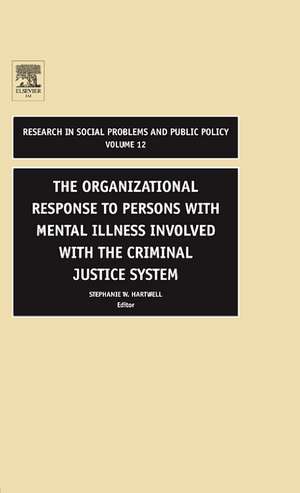Organizational Response to Persons with Mental Illness Involved with the Criminal Justice System: Research in Social Problems and Public Policy
Autor Stephanie W. Hartwellen Limba Engleză Hardback – 23 iun 2005
Preț: 829.19 lei
Preț vechi: 1076.86 lei
-23% Nou
Puncte Express: 1244
Preț estimativ în valută:
158.67€ • 166.08$ • 132.06£
158.67€ • 166.08$ • 132.06£
Carte tipărită la comandă
Livrare economică 31 martie-14 aprilie
Preluare comenzi: 021 569.72.76
Specificații
ISBN-13: 9780762312313
ISBN-10: 0762312319
Pagini: 232
Dimensiuni: 155 x 234 x 356 mm
Greutate: 0.48 kg
Ediția:New.
Editura: Emerald Publishing
Seria Research in Social Problems and Public Policy
ISBN-10: 0762312319
Pagini: 232
Dimensiuni: 155 x 234 x 356 mm
Greutate: 0.48 kg
Ediția:New.
Editura: Emerald Publishing
Seria Research in Social Problems and Public Policy
Cuprins
List of Contributors. Introduction. (S.W. Hartwell). Part I ߝ Programming and Program Evaluation ߝ Two Cases from Massachusetts.
A Public Health Approach to Address the Mental Health Needs of Juvenile Offenders. (R.A. McMackin, E. Pittel). E Pluribus Unum: Creating a Multi-Organizational Structure for Serving Arrestees with Serious Mental Illness. (J.C. Clayfield et al.). Part II ߝ Risk Assessment ߝ Two Cases from Around the Globe. Rambo: The Evaluation of an Intervention Program for UK Mentally Abnormal Young Offenders. (T.I. Mutale). Risk Assessment and Violent Recidivism Risk Management in Convicts from Argentina. (J.O. Folino). Part III ߝ Mitigating Circumstances ߝ Two Cases from the Courts. Offender Ethnicity and Juvenile Court Referrals to Substance Abuse Services. (C.S. Breda).
Benefits and Risks of Using "Diminished Capacity" Mitigation in Death Penalty Proceedings. (B. Bjerregaard, M.D. Smith, S.J. Fogel). Part IV ߝ Prisons ߝ Two Cases on Identification and Treatment of Mentally Ill Offenders Behind Bars.
Screening for Serious Mental Illness among Criminal Offenders. (J.A. Swartz, A.J. Lurigio). The Impact of a Residential Treatment Unit on the Prison Adjustment Of Mentally Disordered Inmates.
(C. Gagliardi). Part V ߝ Assessing Outcomes ߝ Two Studies Examining Outcomes of Ex-Offenders with Mental Illness. Beyond Recidivism: Identifying Additional Measures of Success for Special Offenders Programs. (A.M. Coté, K.A. Mahaffy). The Organizational Response to Community Re-Entry. (S.W. Hartwell).
A Public Health Approach to Address the Mental Health Needs of Juvenile Offenders. (R.A. McMackin, E. Pittel). E Pluribus Unum: Creating a Multi-Organizational Structure for Serving Arrestees with Serious Mental Illness. (J.C. Clayfield et al.). Part II ߝ Risk Assessment ߝ Two Cases from Around the Globe. Rambo: The Evaluation of an Intervention Program for UK Mentally Abnormal Young Offenders. (T.I. Mutale). Risk Assessment and Violent Recidivism Risk Management in Convicts from Argentina. (J.O. Folino). Part III ߝ Mitigating Circumstances ߝ Two Cases from the Courts. Offender Ethnicity and Juvenile Court Referrals to Substance Abuse Services. (C.S. Breda).
Benefits and Risks of Using "Diminished Capacity" Mitigation in Death Penalty Proceedings. (B. Bjerregaard, M.D. Smith, S.J. Fogel). Part IV ߝ Prisons ߝ Two Cases on Identification and Treatment of Mentally Ill Offenders Behind Bars.
Screening for Serious Mental Illness among Criminal Offenders. (J.A. Swartz, A.J. Lurigio). The Impact of a Residential Treatment Unit on the Prison Adjustment Of Mentally Disordered Inmates.
(C. Gagliardi). Part V ߝ Assessing Outcomes ߝ Two Studies Examining Outcomes of Ex-Offenders with Mental Illness. Beyond Recidivism: Identifying Additional Measures of Success for Special Offenders Programs. (A.M. Coté, K.A. Mahaffy). The Organizational Response to Community Re-Entry. (S.W. Hartwell).





























